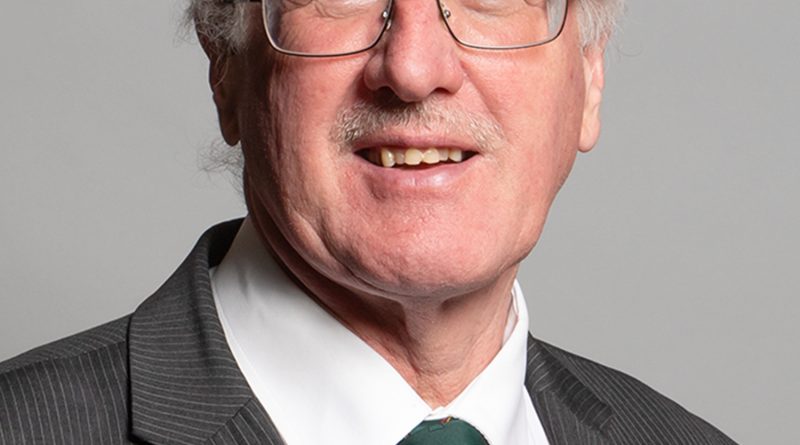Jim Shannon – 2024 Speech on Freedom and Democracy in Iran
The speech made by Jim Shannon, the DUP MP for Strangford, in the House of Commons on 1 February 2024.
I congratulate the hon. Member for Harrow East (Bob Blackman) on setting the scene. His passion and interest in this subject is renowned. In my short time in the House, I cannot remember a time when he did not lead or sponsor such debates. It seems that for various reasons, others who wished to speak have not been able to. It is unfortunate that the input of others has been curtailed, but that does not lessen the importance of the issue that the hon. Gentleman has raised. When it comes to Iran, we in this place have spoken up on many occasions; indeed, we did so yesterday in the free Iran group with Maryam Rajavi. The hon. Member for Southend West (Anna Firth) was at that meeting, and led and chaired it for a short period of time.
This is a big issue—a massive issue. I declare an interest as chair of the all-party parliamentary group for international freedom of religion or belief, speaking up for those of Christian faith, those of other faiths and those of no faith. It is clear to me that that is not just about people’s right to express themselves religiously and the beliefs that they have, but about standing up for human rights. The issue of freedom and democracy in Iran, especially the freedom of religion or belief, continues to escalate—depressingly so. That is why this debate is so important. Violations of freedom of religion or belief happen frequently in Iran, and continue to escalate. The hon. Member for Harrow East is right to highlight the danger that Iran poses to peace in the middle east: it supplies the Houthis with aid and finance, supplies Hezbollah in Lebanon with finance and weapons, supplies Hamas in Gaza with aid, arms and finance, and supplies many terrorist groups in Syria in the same way. Of course, Iran also supplies drones to Russia to use against Ukraine, so it is an instigator of war and an opposer of peace in the middle east.
As persecution and violations of religious freedom increase in frequency and impact, I and other members of the APPG have submitted several written questions to the Foreign, Commonwealth and Development Office. I am very pleased to see the Minister in his place, because he is always helpful in his responses. We have written to the FCDO with a large number of questions over a period of time, but unfortunately, responses have not been forthcoming. I ask the Minister to introduce some speed into the process, if possible, to secure an answer within the prescribed time: the FCDO said it would respond to our questions, and is duty bound to do so, but has not responded yet. The incidents we have highlighted and the FCDO’s response to them must be brought to Parliament’s attention, as well as the importance of developing better policies and sanctions against Iran for those actions and for its denial of freedoms and democracy.
The one thing that has always bothered me when it comes to Iran is its violations against women and children. They have been attacked, brutalised, and scarred by acid attacks, they have no access to jobs, education or ownership of property, they do not have the right to marriage, and many other opportunities in society are denied them. Over Christmas, several Christians were arrested in Iran, with no response yet from the FCDO—again, we are waiting for a response. Iran finally released on temporary bail two journalists who covered the death in custody of Mahsa Amini, which led to the mass protests in 2022. We asked the FCDO whether the Minister would make an assessment of the implications of those releases for its policies, but as yet, there has been no response.
Recently, the Iranian Government displaced Baha’i farmers by seizing farmland that they had been tending for several generations. The FCDO responded to my question on that topic by stating:
“At the 78th UN General Assembly, we co-sponsored the Iran Human Rights Resolution, calling for Iran to eliminate, in law and in practice, all forms of discrimination on the basis of thought, conscience, religion or belief. We are committed to promoting religious freedom and will continue to work with partners to advocate for the rights of the Baha’i community in Iran.”
Such action is commendable and appreciated. What actions have been taken to help implement that resolution?
Again, I ask these questions because I know the Minister will respond; I also look forward to the response of the shadow Minister, the hon. Member for Caerphilly (Wayne David), and of the SNP spokesperson, the hon. Member for Linlithgow and East Falkirk (Martyn Day). The UK recently enacted new sanctions against Iranian individuals for human rights violations, including flogging as a punishment for exercising freedom of religion or belief. Roya Heshmati was flogged by police for not wearing a hijab in a picture posted on her social media— I have also posed a question to the FCDO on that topic. What sanctions have been imposed on those who inflict such persecution?
Most importantly, potential violence and armed conflict with other countries may impact the rights of democracy and freedom, especially for religious minorities in Iran, so we must decide what policies are going to be enacted. Iranian-backed groups have attacked a US base in Jordan, and this brings about the increase of tensions between the west and Iran, despite Iran’s denial of its involvement in the attack—it got its proxies to carry out it out. As armed conflict and violence increase, the oppression of religious minorities increases tenfold. For someone to be a Shi’a, a Baha’i, a Christian or a member of an ethnic minority in Iran decreases their life expectancy.
We must be ever mindful of the situation of religious minorities in Iran, but also of what the potential effect may be of UK actions against Iran through sanctions and changes in diplomatic relations. The hon. Member for Harrow East made a point about what we need to do and to do more of, and it is quite clear that the sanctions the Government are imposing are not effective. Because of that, we have to look at other methods, such as stronger sanctions or other ideas. Again, I would like to hear from the Minister, if possible, what thoughts he has about how we can hit Iran harder.
Iran is continuing to arbitrarily detain human rights defender and 2023 Nobel peace prize recipient Narges Mohammadi, subjecting her to torture and other ill treatment by deliberately denying or severely delaying her access to adequate healthcare to coerce her into adhering to Iran’s abusive and degrading compulsory veiling laws. This places Narges Mohammadi’s health at great risk, particularly as she has serious heart and lung conditions. Jail is never good for someone’s health, and if they are in bad health, it is even worse.
If Iran is willing to imprison and mistreat such an individual, what is to prevent it from doing so with ordinary individuals in Iran who have religious identities or beliefs different from those of the majority? Although we may not be able to force Iran to change its laws, we can place further requirements on their doing trade with the UK. When we look at trade last year, we see that the UK exported nearly £224 million of trade to Iran, and in return Iran sold back some £190 million. What regulations and policies are companies required to adhere to for such trade to occur? Are there any human rights and religious freedom requirements in place, or inspections of companies in Iran to ensure that they adhere to human rights working conditions and do not discriminate against religious minorities in hiring or in the workplace? These are the things I would like to see.
I conclude with this: the need for Iran to raise its treatment of religious minorities and to provide citizens with democracy is becoming more and more necessary. That is why the hon. Gentleman’s debate today is so important, and we hope—we look to everyone for this, but ultimately to the Minister—that the response will be one that gives us heart. As you know, Mr Deputy Speaker, I speak today on behalf of my brothers and sisters in the faith in Iran, who do not have the opportunity to worship their God as I do. It is for that reason that I thought I had to be here to speak for them.



